Nursing Assignment 1: Spirituality, Ethics, and Healthcare Processes
VerifiedAdded on 2022/12/20
|7
|1538
|41
Essay
AI Summary
This nursing assignment delves into the intricate relationship between spirituality, ethics, and healthcare practices. It begins by discussing the Christian perspective on the nature of spirituality and its ethical implications, considering the impact of postmodern relativism on healthcare processes. The assignment then examines scientism, its role in shaping healthcare policies, and its limitations. It also explores the concept of ultimate reality and the nature of the universe, contrasting scientific and philosophical viewpoints. The student reflects on their personal ethical framework, emphasizing the influence of life experiences and emotional intelligence. The assignment utilizes various references to support the arguments made and provides a comprehensive analysis of the complex interplay between spirituality, ethics, and healthcare.
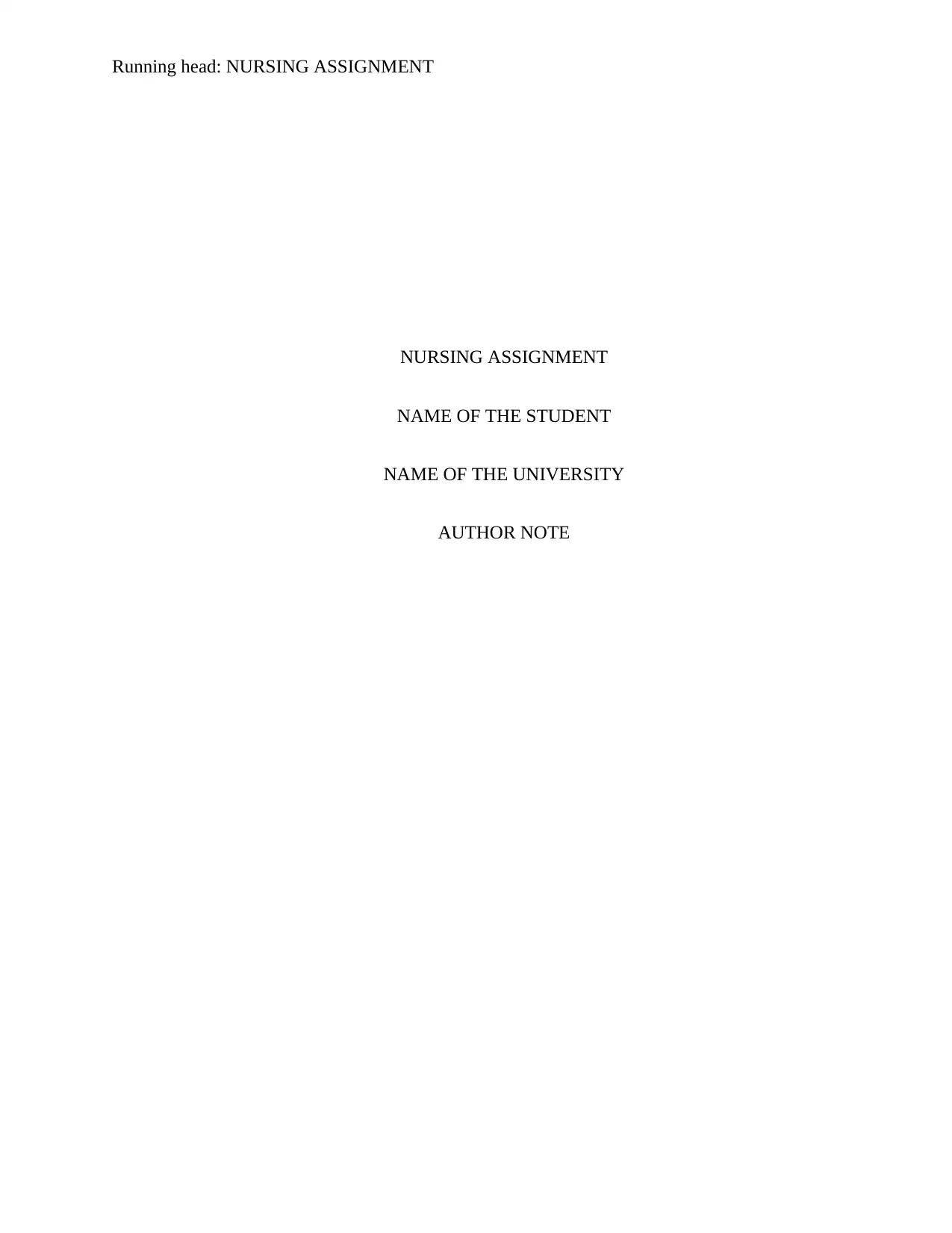
Running head: NURSING ASSIGNMENT
NURSING ASSIGNMENT
NAME OF THE STUDENT
NAME OF THE UNIVERSITY
AUTHOR NOTE
NURSING ASSIGNMENT
NAME OF THE STUDENT
NAME OF THE UNIVERSITY
AUTHOR NOTE
Paraphrase This Document
Need a fresh take? Get an instant paraphrase of this document with our AI Paraphraser
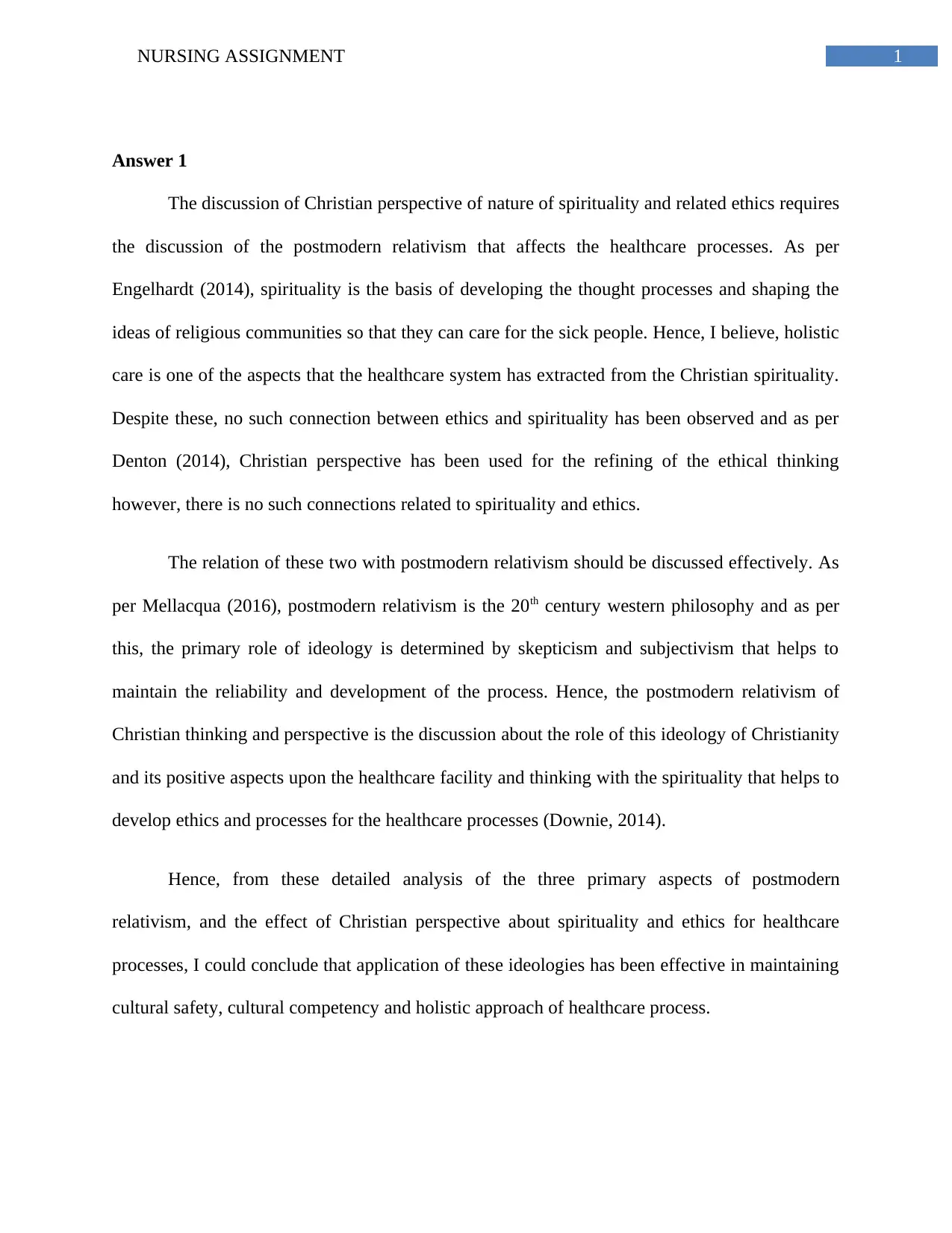
1NURSING ASSIGNMENT
Answer 1
The discussion of Christian perspective of nature of spirituality and related ethics requires
the discussion of the postmodern relativism that affects the healthcare processes. As per
Engelhardt (2014), spirituality is the basis of developing the thought processes and shaping the
ideas of religious communities so that they can care for the sick people. Hence, I believe, holistic
care is one of the aspects that the healthcare system has extracted from the Christian spirituality.
Despite these, no such connection between ethics and spirituality has been observed and as per
Denton (2014), Christian perspective has been used for the refining of the ethical thinking
however, there is no such connections related to spirituality and ethics.
The relation of these two with postmodern relativism should be discussed effectively. As
per Mellacqua (2016), postmodern relativism is the 20th century western philosophy and as per
this, the primary role of ideology is determined by skepticism and subjectivism that helps to
maintain the reliability and development of the process. Hence, the postmodern relativism of
Christian thinking and perspective is the discussion about the role of this ideology of Christianity
and its positive aspects upon the healthcare facility and thinking with the spirituality that helps to
develop ethics and processes for the healthcare processes (Downie, 2014).
Hence, from these detailed analysis of the three primary aspects of postmodern
relativism, and the effect of Christian perspective about spirituality and ethics for healthcare
processes, I could conclude that application of these ideologies has been effective in maintaining
cultural safety, cultural competency and holistic approach of healthcare process.
Answer 1
The discussion of Christian perspective of nature of spirituality and related ethics requires
the discussion of the postmodern relativism that affects the healthcare processes. As per
Engelhardt (2014), spirituality is the basis of developing the thought processes and shaping the
ideas of religious communities so that they can care for the sick people. Hence, I believe, holistic
care is one of the aspects that the healthcare system has extracted from the Christian spirituality.
Despite these, no such connection between ethics and spirituality has been observed and as per
Denton (2014), Christian perspective has been used for the refining of the ethical thinking
however, there is no such connections related to spirituality and ethics.
The relation of these two with postmodern relativism should be discussed effectively. As
per Mellacqua (2016), postmodern relativism is the 20th century western philosophy and as per
this, the primary role of ideology is determined by skepticism and subjectivism that helps to
maintain the reliability and development of the process. Hence, the postmodern relativism of
Christian thinking and perspective is the discussion about the role of this ideology of Christianity
and its positive aspects upon the healthcare facility and thinking with the spirituality that helps to
develop ethics and processes for the healthcare processes (Downie, 2014).
Hence, from these detailed analysis of the three primary aspects of postmodern
relativism, and the effect of Christian perspective about spirituality and ethics for healthcare
processes, I could conclude that application of these ideologies has been effective in maintaining
cultural safety, cultural competency and holistic approach of healthcare process.
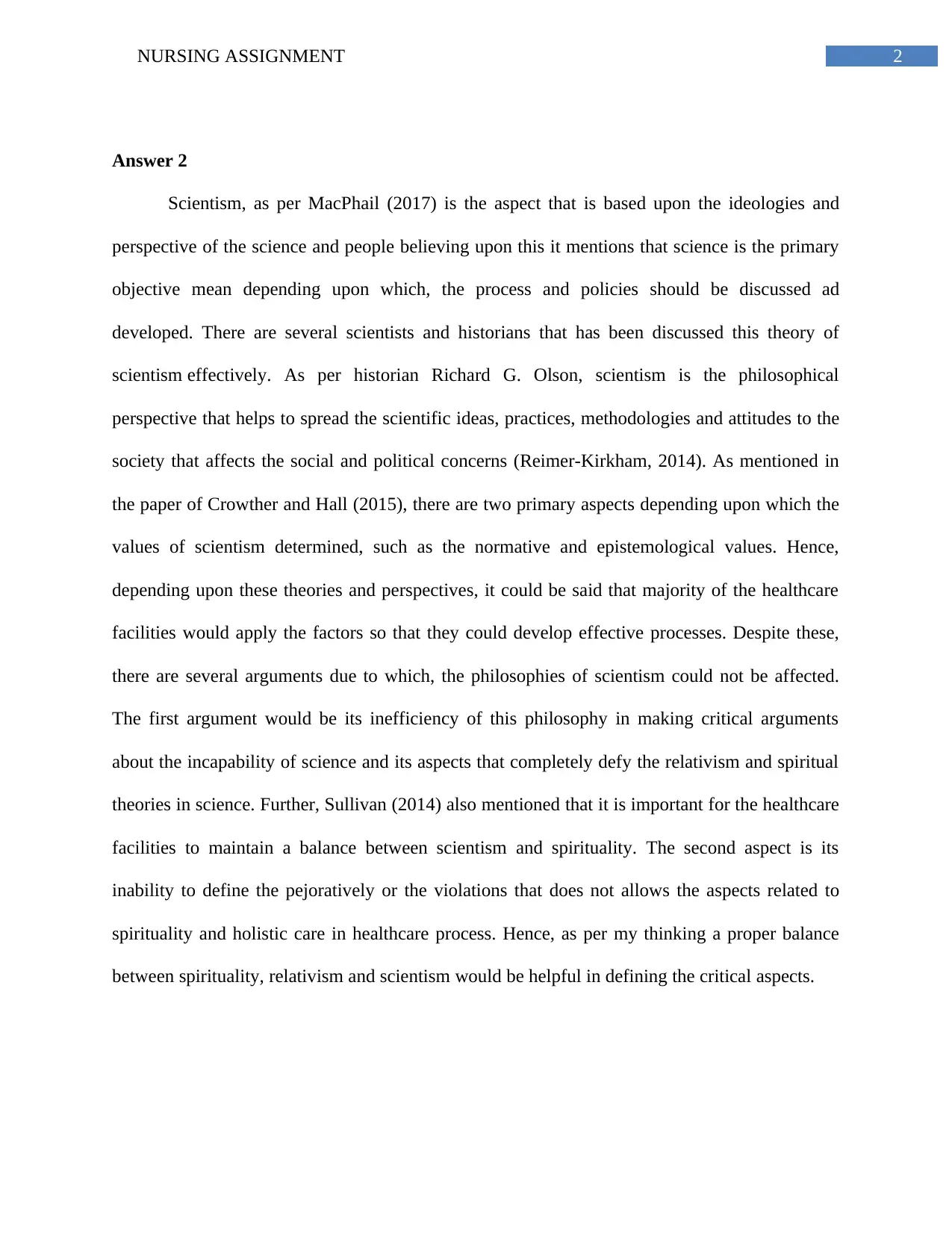
2NURSING ASSIGNMENT
Answer 2
Scientism, as per MacPhail (2017) is the aspect that is based upon the ideologies and
perspective of the science and people believing upon this it mentions that science is the primary
objective mean depending upon which, the process and policies should be discussed ad
developed. There are several scientists and historians that has been discussed this theory of
scientism effectively. As per historian Richard G. Olson, scientism is the philosophical
perspective that helps to spread the scientific ideas, practices, methodologies and attitudes to the
society that affects the social and political concerns (Reimer-Kirkham, 2014). As mentioned in
the paper of Crowther and Hall (2015), there are two primary aspects depending upon which the
values of scientism determined, such as the normative and epistemological values. Hence,
depending upon these theories and perspectives, it could be said that majority of the healthcare
facilities would apply the factors so that they could develop effective processes. Despite these,
there are several arguments due to which, the philosophies of scientism could not be affected.
The first argument would be its inefficiency of this philosophy in making critical arguments
about the incapability of science and its aspects that completely defy the relativism and spiritual
theories in science. Further, Sullivan (2014) also mentioned that it is important for the healthcare
facilities to maintain a balance between scientism and spirituality. The second aspect is its
inability to define the pejoratively or the violations that does not allows the aspects related to
spirituality and holistic care in healthcare process. Hence, as per my thinking a proper balance
between spirituality, relativism and scientism would be helpful in defining the critical aspects.
Answer 2
Scientism, as per MacPhail (2017) is the aspect that is based upon the ideologies and
perspective of the science and people believing upon this it mentions that science is the primary
objective mean depending upon which, the process and policies should be discussed ad
developed. There are several scientists and historians that has been discussed this theory of
scientism effectively. As per historian Richard G. Olson, scientism is the philosophical
perspective that helps to spread the scientific ideas, practices, methodologies and attitudes to the
society that affects the social and political concerns (Reimer-Kirkham, 2014). As mentioned in
the paper of Crowther and Hall (2015), there are two primary aspects depending upon which the
values of scientism determined, such as the normative and epistemological values. Hence,
depending upon these theories and perspectives, it could be said that majority of the healthcare
facilities would apply the factors so that they could develop effective processes. Despite these,
there are several arguments due to which, the philosophies of scientism could not be affected.
The first argument would be its inefficiency of this philosophy in making critical arguments
about the incapability of science and its aspects that completely defy the relativism and spiritual
theories in science. Further, Sullivan (2014) also mentioned that it is important for the healthcare
facilities to maintain a balance between scientism and spirituality. The second aspect is its
inability to define the pejoratively or the violations that does not allows the aspects related to
spirituality and holistic care in healthcare process. Hence, as per my thinking a proper balance
between spirituality, relativism and scientism would be helpful in defining the critical aspects.
⊘ This is a preview!⊘
Do you want full access?
Subscribe today to unlock all pages.

Trusted by 1+ million students worldwide
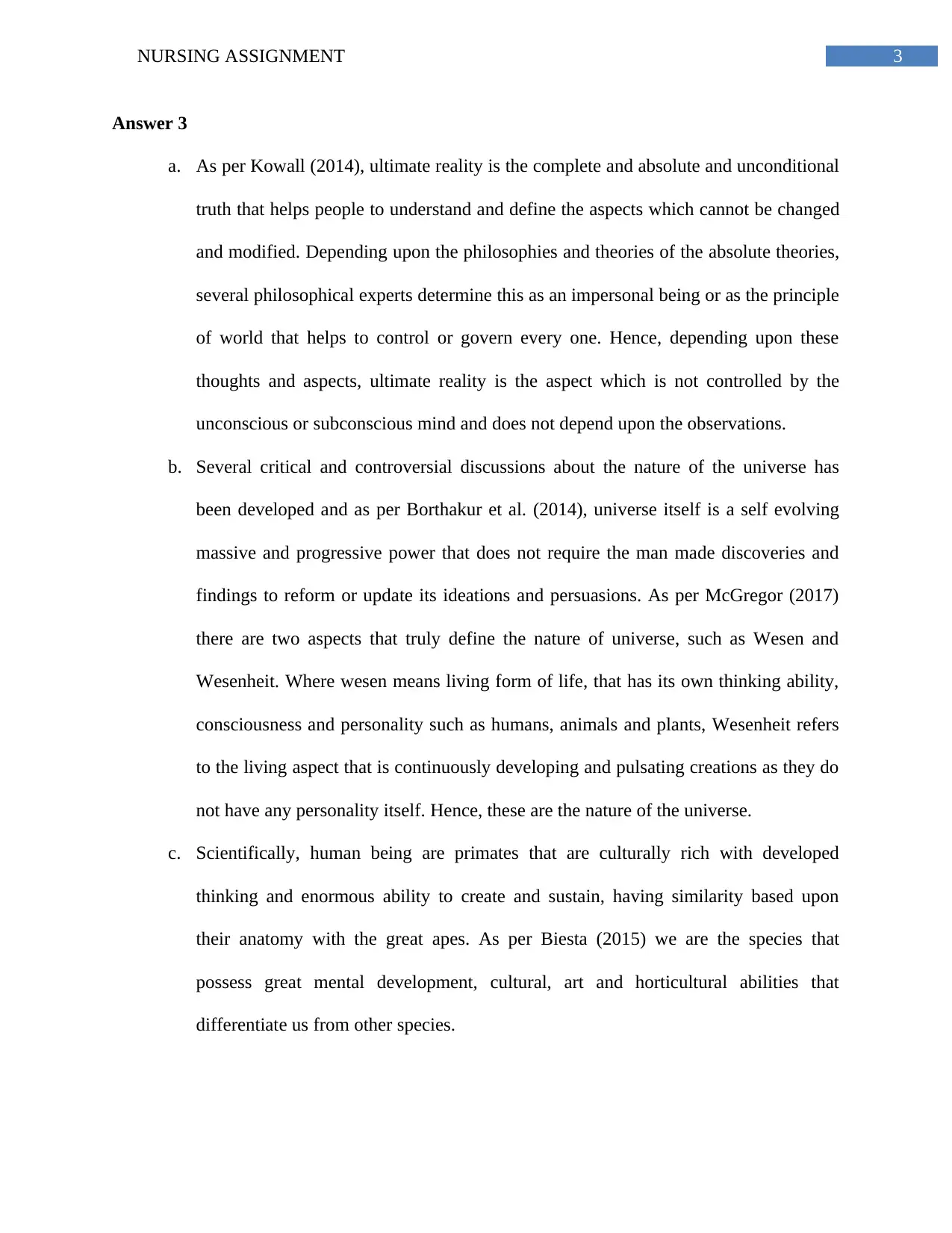
3NURSING ASSIGNMENT
Answer 3
a. As per Kowall (2014), ultimate reality is the complete and absolute and unconditional
truth that helps people to understand and define the aspects which cannot be changed
and modified. Depending upon the philosophies and theories of the absolute theories,
several philosophical experts determine this as an impersonal being or as the principle
of world that helps to control or govern every one. Hence, depending upon these
thoughts and aspects, ultimate reality is the aspect which is not controlled by the
unconscious or subconscious mind and does not depend upon the observations.
b. Several critical and controversial discussions about the nature of the universe has
been developed and as per Borthakur et al. (2014), universe itself is a self evolving
massive and progressive power that does not require the man made discoveries and
findings to reform or update its ideations and persuasions. As per McGregor (2017)
there are two aspects that truly define the nature of universe, such as Wesen and
Wesenheit. Where wesen means living form of life, that has its own thinking ability,
consciousness and personality such as humans, animals and plants, Wesenheit refers
to the living aspect that is continuously developing and pulsating creations as they do
not have any personality itself. Hence, these are the nature of the universe.
c. Scientifically, human being are primates that are culturally rich with developed
thinking and enormous ability to create and sustain, having similarity based upon
their anatomy with the great apes. As per Biesta (2015) we are the species that
possess great mental development, cultural, art and horticultural abilities that
differentiate us from other species.
Answer 3
a. As per Kowall (2014), ultimate reality is the complete and absolute and unconditional
truth that helps people to understand and define the aspects which cannot be changed
and modified. Depending upon the philosophies and theories of the absolute theories,
several philosophical experts determine this as an impersonal being or as the principle
of world that helps to control or govern every one. Hence, depending upon these
thoughts and aspects, ultimate reality is the aspect which is not controlled by the
unconscious or subconscious mind and does not depend upon the observations.
b. Several critical and controversial discussions about the nature of the universe has
been developed and as per Borthakur et al. (2014), universe itself is a self evolving
massive and progressive power that does not require the man made discoveries and
findings to reform or update its ideations and persuasions. As per McGregor (2017)
there are two aspects that truly define the nature of universe, such as Wesen and
Wesenheit. Where wesen means living form of life, that has its own thinking ability,
consciousness and personality such as humans, animals and plants, Wesenheit refers
to the living aspect that is continuously developing and pulsating creations as they do
not have any personality itself. Hence, these are the nature of the universe.
c. Scientifically, human being are primates that are culturally rich with developed
thinking and enormous ability to create and sustain, having similarity based upon
their anatomy with the great apes. As per Biesta (2015) we are the species that
possess great mental development, cultural, art and horticultural abilities that
differentiate us from other species.
Paraphrase This Document
Need a fresh take? Get an instant paraphrase of this document with our AI Paraphraser
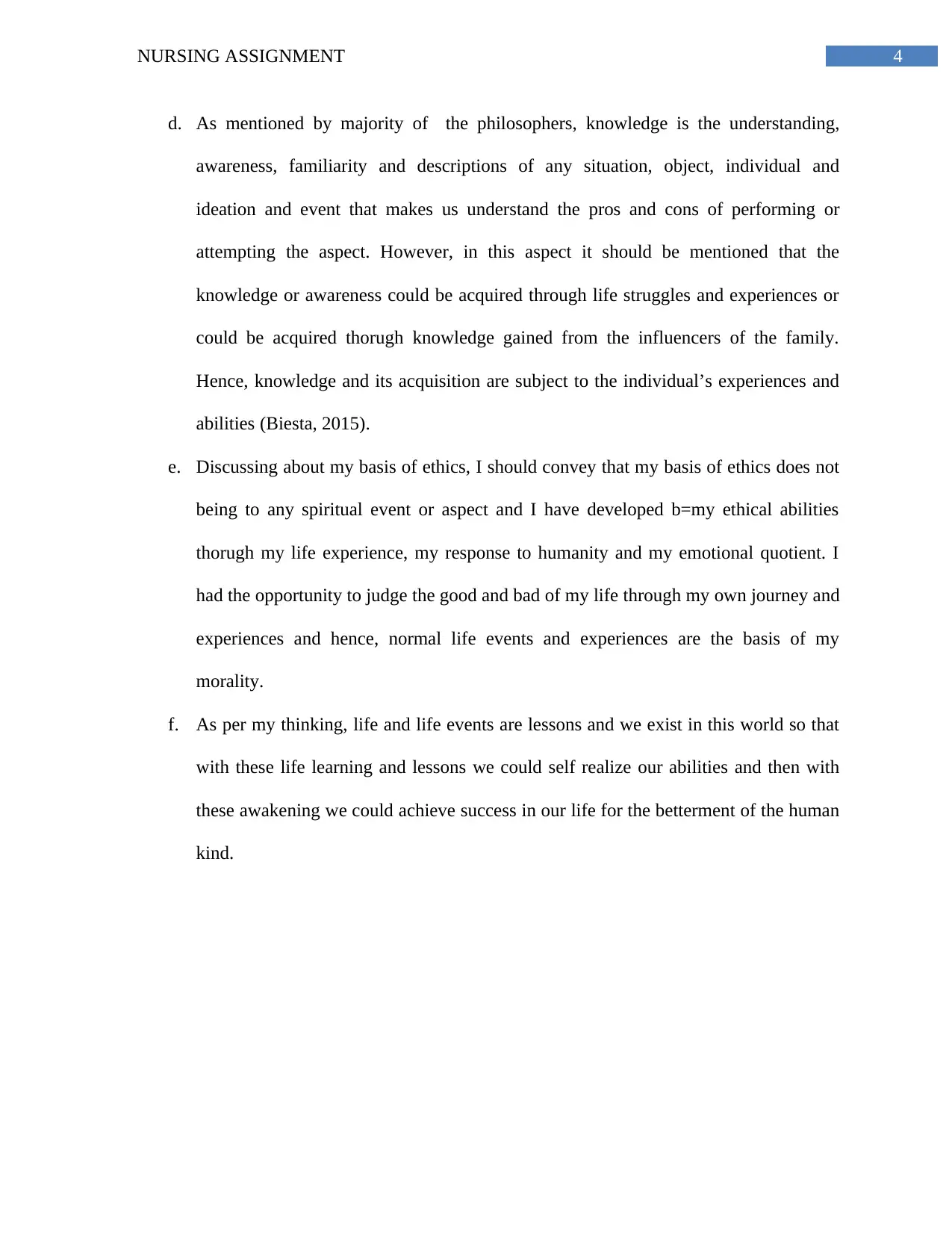
4NURSING ASSIGNMENT
d. As mentioned by majority of the philosophers, knowledge is the understanding,
awareness, familiarity and descriptions of any situation, object, individual and
ideation and event that makes us understand the pros and cons of performing or
attempting the aspect. However, in this aspect it should be mentioned that the
knowledge or awareness could be acquired through life struggles and experiences or
could be acquired thorugh knowledge gained from the influencers of the family.
Hence, knowledge and its acquisition are subject to the individual’s experiences and
abilities (Biesta, 2015).
e. Discussing about my basis of ethics, I should convey that my basis of ethics does not
being to any spiritual event or aspect and I have developed b=my ethical abilities
thorugh my life experience, my response to humanity and my emotional quotient. I
had the opportunity to judge the good and bad of my life through my own journey and
experiences and hence, normal life events and experiences are the basis of my
morality.
f. As per my thinking, life and life events are lessons and we exist in this world so that
with these life learning and lessons we could self realize our abilities and then with
these awakening we could achieve success in our life for the betterment of the human
kind.
d. As mentioned by majority of the philosophers, knowledge is the understanding,
awareness, familiarity and descriptions of any situation, object, individual and
ideation and event that makes us understand the pros and cons of performing or
attempting the aspect. However, in this aspect it should be mentioned that the
knowledge or awareness could be acquired through life struggles and experiences or
could be acquired thorugh knowledge gained from the influencers of the family.
Hence, knowledge and its acquisition are subject to the individual’s experiences and
abilities (Biesta, 2015).
e. Discussing about my basis of ethics, I should convey that my basis of ethics does not
being to any spiritual event or aspect and I have developed b=my ethical abilities
thorugh my life experience, my response to humanity and my emotional quotient. I
had the opportunity to judge the good and bad of my life through my own journey and
experiences and hence, normal life events and experiences are the basis of my
morality.
f. As per my thinking, life and life events are lessons and we exist in this world so that
with these life learning and lessons we could self realize our abilities and then with
these awakening we could achieve success in our life for the betterment of the human
kind.
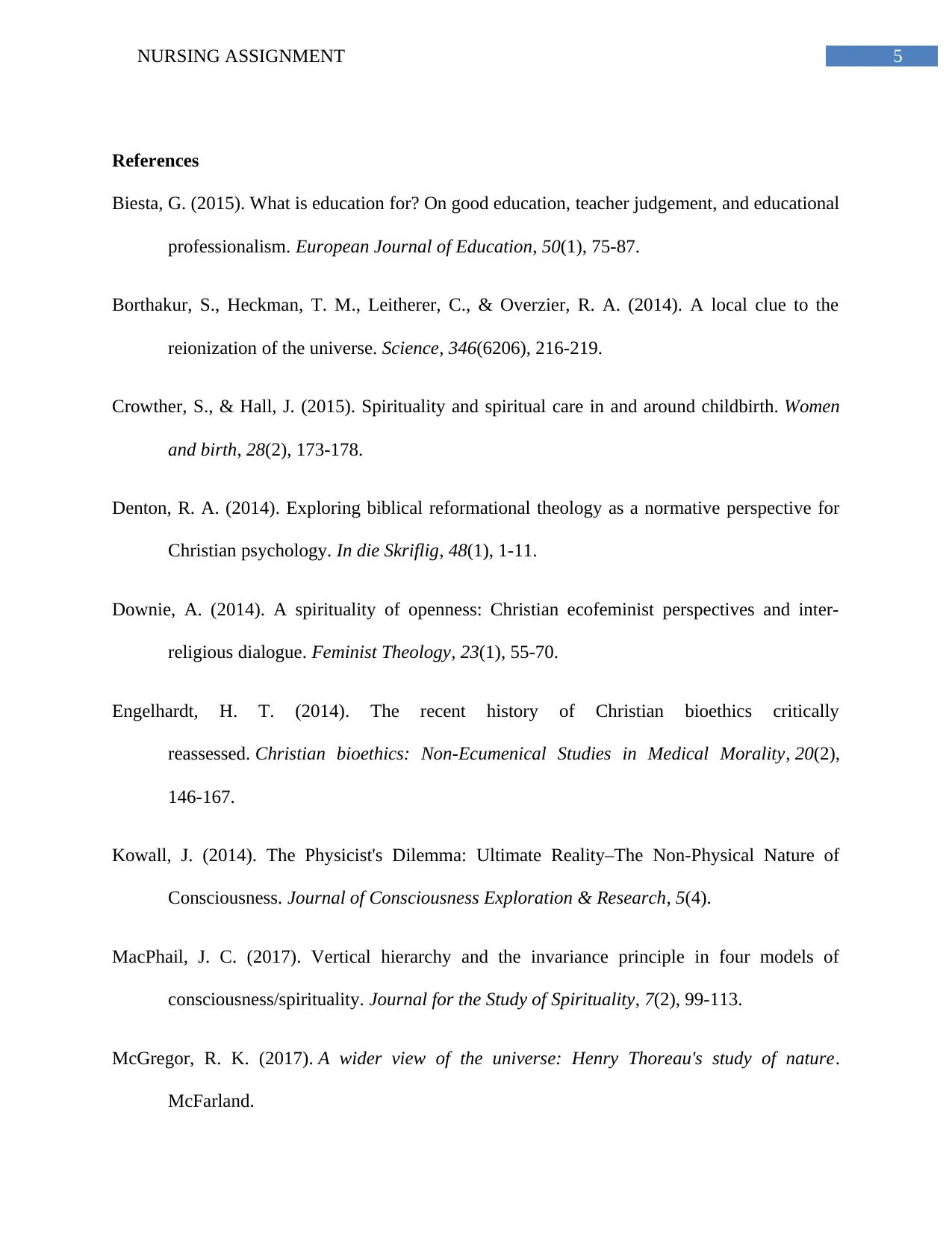
5NURSING ASSIGNMENT
References
Biesta, G. (2015). What is education for? On good education, teacher judgement, and educational
professionalism. European Journal of Education, 50(1), 75-87.
Borthakur, S., Heckman, T. M., Leitherer, C., & Overzier, R. A. (2014). A local clue to the
reionization of the universe. Science, 346(6206), 216-219.
Crowther, S., & Hall, J. (2015). Spirituality and spiritual care in and around childbirth. Women
and birth, 28(2), 173-178.
Denton, R. A. (2014). Exploring biblical reformational theology as a normative perspective for
Christian psychology. In die Skriflig, 48(1), 1-11.
Downie, A. (2014). A spirituality of openness: Christian ecofeminist perspectives and inter-
religious dialogue. Feminist Theology, 23(1), 55-70.
Engelhardt, H. T. (2014). The recent history of Christian bioethics critically
reassessed. Christian bioethics: Non-Ecumenical Studies in Medical Morality, 20(2),
146-167.
Kowall, J. (2014). The Physicist's Dilemma: Ultimate Reality–The Non-Physical Nature of
Consciousness. Journal of Consciousness Exploration & Research, 5(4).
MacPhail, J. C. (2017). Vertical hierarchy and the invariance principle in four models of
consciousness/spirituality. Journal for the Study of Spirituality, 7(2), 99-113.
McGregor, R. K. (2017). A wider view of the universe: Henry Thoreau's study of nature.
McFarland.
References
Biesta, G. (2015). What is education for? On good education, teacher judgement, and educational
professionalism. European Journal of Education, 50(1), 75-87.
Borthakur, S., Heckman, T. M., Leitherer, C., & Overzier, R. A. (2014). A local clue to the
reionization of the universe. Science, 346(6206), 216-219.
Crowther, S., & Hall, J. (2015). Spirituality and spiritual care in and around childbirth. Women
and birth, 28(2), 173-178.
Denton, R. A. (2014). Exploring biblical reformational theology as a normative perspective for
Christian psychology. In die Skriflig, 48(1), 1-11.
Downie, A. (2014). A spirituality of openness: Christian ecofeminist perspectives and inter-
religious dialogue. Feminist Theology, 23(1), 55-70.
Engelhardt, H. T. (2014). The recent history of Christian bioethics critically
reassessed. Christian bioethics: Non-Ecumenical Studies in Medical Morality, 20(2),
146-167.
Kowall, J. (2014). The Physicist's Dilemma: Ultimate Reality–The Non-Physical Nature of
Consciousness. Journal of Consciousness Exploration & Research, 5(4).
MacPhail, J. C. (2017). Vertical hierarchy and the invariance principle in four models of
consciousness/spirituality. Journal for the Study of Spirituality, 7(2), 99-113.
McGregor, R. K. (2017). A wider view of the universe: Henry Thoreau's study of nature.
McFarland.
⊘ This is a preview!⊘
Do you want full access?
Subscribe today to unlock all pages.

Trusted by 1+ million students worldwide
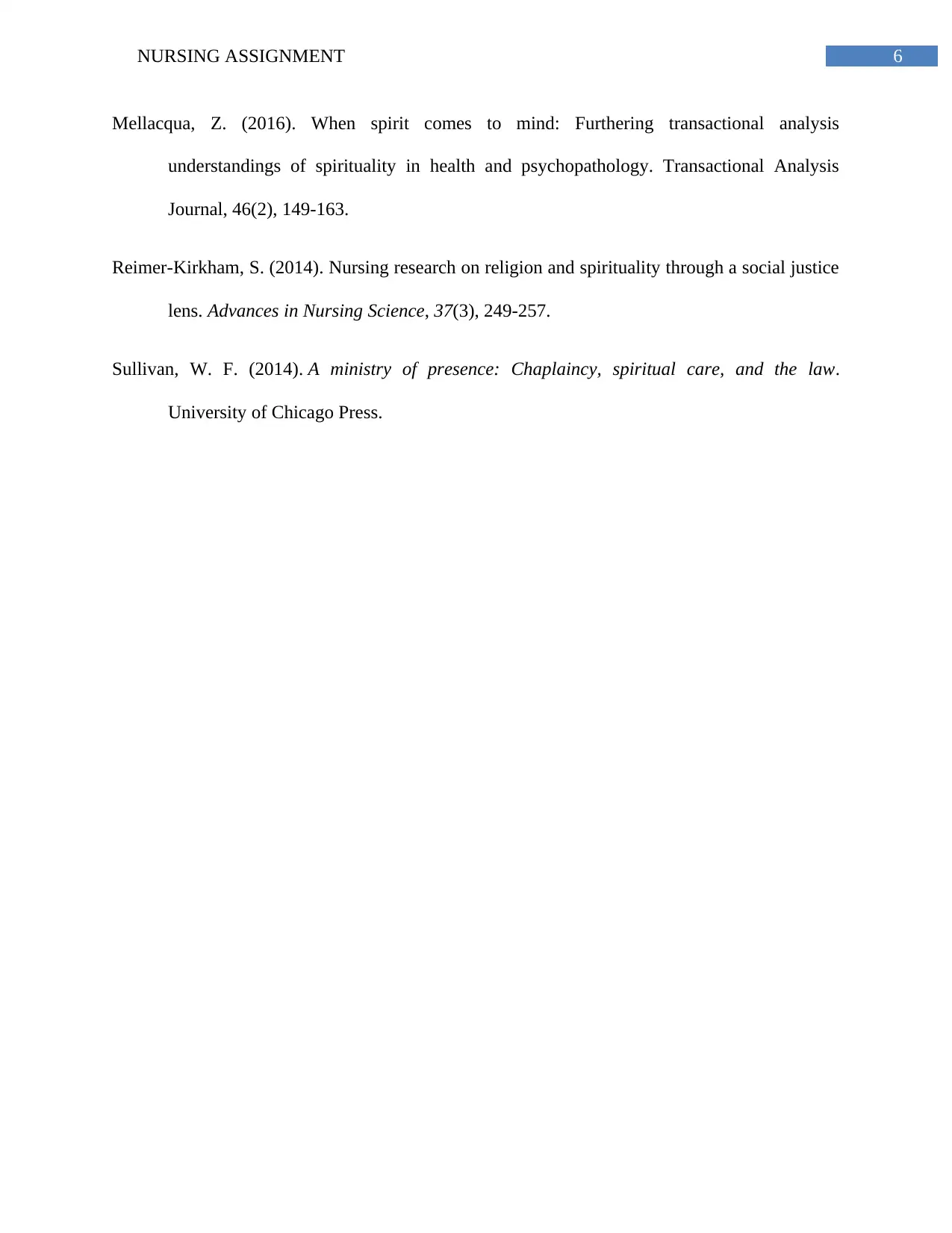
6NURSING ASSIGNMENT
Mellacqua, Z. (2016). When spirit comes to mind: Furthering transactional analysis
understandings of spirituality in health and psychopathology. Transactional Analysis
Journal, 46(2), 149-163.
Reimer-Kirkham, S. (2014). Nursing research on religion and spirituality through a social justice
lens. Advances in Nursing Science, 37(3), 249-257.
Sullivan, W. F. (2014). A ministry of presence: Chaplaincy, spiritual care, and the law.
University of Chicago Press.
Mellacqua, Z. (2016). When spirit comes to mind: Furthering transactional analysis
understandings of spirituality in health and psychopathology. Transactional Analysis
Journal, 46(2), 149-163.
Reimer-Kirkham, S. (2014). Nursing research on religion and spirituality through a social justice
lens. Advances in Nursing Science, 37(3), 249-257.
Sullivan, W. F. (2014). A ministry of presence: Chaplaincy, spiritual care, and the law.
University of Chicago Press.
1 out of 7
Related Documents
Your All-in-One AI-Powered Toolkit for Academic Success.
+13062052269
info@desklib.com
Available 24*7 on WhatsApp / Email
![[object Object]](/_next/static/media/star-bottom.7253800d.svg)
Unlock your academic potential
Copyright © 2020–2026 A2Z Services. All Rights Reserved. Developed and managed by ZUCOL.
![Reflective Essay on Religion, Spirituality, and Ethics - [Course Name]](/_next/image/?url=https%3A%2F%2Fdesklib.com%2Fmedia%2Fimages%2Fkp%2F5be92086d07d49f99eea006b30d77d2a.jpg&w=256&q=75)



